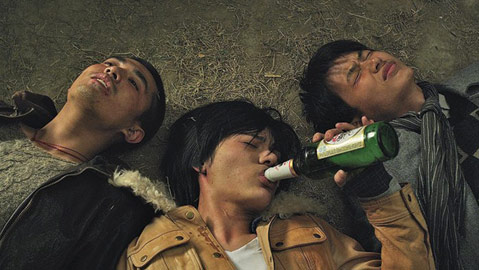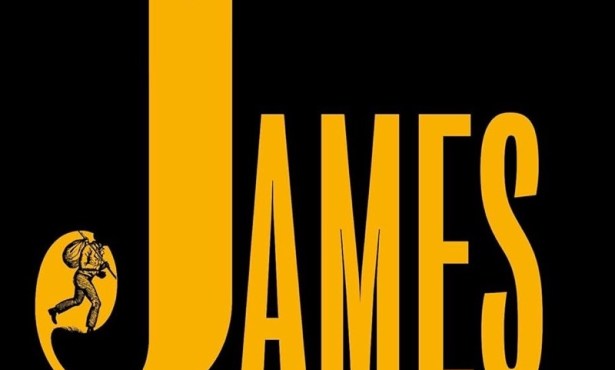Woodard: Warm Fuzzies, International Appeal, and A Romanian Jewel
Jackie, Boucherie Halal, Beyond the Hills, and More

We’re just past the midfest hump at this point in the SBIFF ’13 game, but already, a strong contender in the crowd-pleaser sweepstakes is the Dutch-goes-American road movie number Jackie, the popularity of which forced me to watch it from the severe perspective of a front row seat. In a way, writer-director Antoinette Breuner’s Jackie is something of an ideal blender of popcorny wiles and arthouse-y washes, with English dialogue sprinkled with Dutch, for old country cred. It’s a populist number, with quirky artful touches in the margins, a movie in which its mother-and-twin-daughter characters tool about the rugged outskirts of the American southwest with the sassy kickass post-hippy character played with dry wit and shaggy charm by Holly Hunter.
Twin adult sisters in the Holland, raised by gay fathers and with an American surrogate mother they never met, are summoned to New Mexico by news of an eccentric, injured woman appearing to be their absentee mother (this tangled “mother” theme keeps popping up in this festival program, what with Sister, Pieta, and probably others I’ve yet to see). They experience life in a funky RV, karaoke in a cowboy bar, quasi-maternal bonding, singing around a desert campfire and other encounters far from the Dutch soil.
A salty funny Euro-gonzo-cowboy outing, Jackie does the trick with freshness and its own brand of warm fuzzies, of its own devising. And the crowds keep going wild.
INTERNATIONAL FARE: One of the great virtues of the “I” component of SBIFF is the opportunity to escape from the America-centric perspective for a couple of hours of immersive, voyeuristic visitation to other ways of being, sans jetlag. Of course, it’s a superficial and fleeting way to travel, but the worldly window factor can’t be denied.
Thanks to the wide-ranging international component of the program — stronger and more varied than last year’s bunch — we are carried to such diverse microcosms as the Arabic community in Montreal in the well-made and involving Boucherie Halal, the neo-realist slice of life in Indian slums in Mumbai King (with non-professional actors and a rough-style charm), and wholly other slice of global life in Beijing Flickers. In Yuan Zhang’s intriguing yet uneven film about frustrated young Chinese in a rapidly changing, westernizing, and corrupted Beijing, there seems an indictment of the western shift, while the film itself taps into western, Hollywood-veneered manners.
INDIAN DOCS: India is the focus of two fascinating, and very different documentaries. Blood Brother is Steve Hoover’s passionate and tear-inducing of his friend Rocky’s compassionate obsession with caring for AIDS afflicted children in an Indian orphanage. Once Hoover visits the orphanage, with camera in tow, he — and we, by extension — becomes entranced by the beauty and strength of the children, off in the margins of society. A Grand Jury prize winner at Sundance just days earlier, and a fine example of a DIY indie film full of a message and heart, Blood Brother is one of the true gems of this year’s documentary contingent.
In A World Beyond, Canadian director Nisha Pahuja’s dualistic study of female archetypes in India, takes as its subject two radically different domains for Indian women, in this male-dominated and notably gender unequal country. In one corner, the filmmaker burrows into the strange, glitzy and ethically questionable realm of the Miss India beauty pageant, cross-cut with a Hindu “training camp” for young women, Durga Vahini (allowing a film crew into its compound for the first time), and a young woman willing to fight to the death for her religious beliefs. These diametrically opposed worlds create a strange, not-necessarily-judgmental juxtaposition, hovering around an implicit question faced by young Indian women: “should I be par o the old world, or the new world?”
SLOW ROMANIAN JEWEL: One of the slower and more memory-lingering films I’ve seen at the festival is Beyond the Hills, Romanian director Cristian Mungio’s oddly hypnotic, Robert Bresson-like invention: call it a minimalist Monastery melodrama. In the coarsest of film referential terms, think Diary of a Country Priest meets The Exorcist.
Slow, yes, but never dull, assuming you can catch onto the ingenious cadences of the film’s rhythms and the visually lulling cloistered atmosphere, which makes the intrusions of real worldly evil and tension all the more startling. The narrative premise is simple, yet gradually thickening plot, involving a troubled young woman who seeks an anchor with her old friend (and we presume lover) from an orphanage, who is now settled into the pious life in a remote Orthodox Monastery. The secular visitor Alina (a great wild ride performance by Cristina Flutur, garnering an award at Cannes) becomes a spark for unrest and much gnashing of teeth and religious values for the presiding priest and the startled nuns, unaccustomed to a hysterical — and devil-possessed? — woman.
Its two-and-a-half hour length seems none too long or lavish to let the juices stew and undercurrents fester, along with thematic tensions of religious piety vs. human frailty, and sensual vs. spiritual love, and other conflicts bubbling just below the alternately tranquil and volatile surfaces. Among other actual and metaphorical details in this enigmatic film, reality splashes mud in the eye of piety. A day later, I’m still trying to make sense of the film, a condition others have confessed, as well, a sure sign of film’s — and this film’s — strange powers.
ONLY AT SBIFF DEPT.: It was after midnight at the Metroplex compound of SBIFF, and several handfuls of late night diehards were hanging around after the screening of Chaika, to hear Spanish writer-director Miguel Ángel Jiménez Colmenar talk about his challenging project about Kazakhstan, actually shot in Georgia, due to the Kazakhs disapproval of the frankly sexual aspects of the script. It seemed an appropriate time to watch this midnight appropriate flick.
Chaika, named after the first woman in space courtesy of Kruschev’s USSR in 1963, but about a melancholic prostitute (the bewitching Salome Demuria) and her drifter mate, drifts along with a kind of taciturn, bleak chic. The settings are forbidding, either fierce wintry chill or deadly heat down by the tracks where he works, and she is tempted by the lure of the nomadic impulse, but the moody outskirts-of-the-world atmospherics of the film exerts a certain gloomy magnetism.
Gloom of another sort, and in a wildly different corner of the world, hovers Sandrine Bonnaire’s film Maddened by His Absence, a controlled meditation on the sense of loss and lingering grief over a child’s death. William Hurt stars as a man whose young son died in an accident years earlier, and is flung deeper into his own personal abyss upon returning to France from his Boston to settle hi father’s estate. Reconnecting with his ex-wife, who now has a new family a young son with her new husband, his character who is, as he finally tells her outright, one hour into the film, “maddened by his absence,” and proceeds to prove it.
Hurt is precisely the right man for the job, as someone who can convey the sense of demonic underpinnings beneath his cool exterior. He’s got angst in the basement, which makes this haunting small film work as well as it does. And Estonian “sacred minimalist” composer Arvo Pärt’s powerful musical component, feeding and reflecting the film’s mood, serves as virtually a character unto itself.



